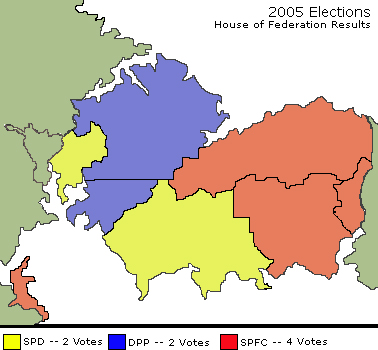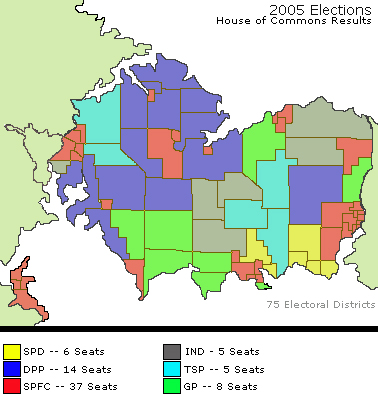Difference between revisions of "Domnonia"
(→[Province d'Inlad]) |
|||
| Line 11: | Line 11: | ||
| align=center colspan=2 | <small>'''One can only be free if all are so.''' | | align=center colspan=2 | <small>'''One can only be free if all are so.''' | ||
|- | |- | ||
| − | | align=center colspan=2 style="background:#f9f9f9;" | http://ns.goobergunch.net/wiki/images/ | + | | align=center colspan=2 style="background:#f9f9f9;" | http://ns.goobergunch.net/wiki/images/Dominidu2.gif<br> |
| − | <small>National Map: [http://ns.goobergunch.net/wiki/images/Dominational. | + | <small>National Map: [http://ns.goobergunch.net/wiki/images/Dominational.png click here] |
|- | |- | ||
|'''Spoken Languages'''<br> - Official<br> - Unofficial || [[English]]<br> [[French]], | |'''Spoken Languages'''<br> - Official<br> - Unofficial || [[English]]<br> [[French]], | ||
Revision as of 17:56, 19 April 2006
| |||||
| One can only be free if all are so. | |||||
 National Map: click here | |||||
| Spoken Languages - Official - Unofficial |
English French, | ||||
| Capital | Cadorn | ||||
| Ten largest metropolitan agglomerations Cadorn(Cadorn, Preston, Aloria) - 32,745,612 | |||||
| Prime Minister | Taylor Carlson (Social Progressive Fiscal Conservative - SPFC) | ||||
| Government type | Bicameral-parliamentary | ||||
| Nation type | Asymetrical Confederation | ||||
| Currency | Domi(DOD) | ||||
| National animal | Domini Owl | ||||
| National flower | Inlad Blue Lotus | ||||
| National colors | Red and White | ||||
| Time Zone | Domini Standard Time | ||||
| Calling Code | +336 +337 | ||||
| Country Code | DO | ||||
| Internet TLD | .do.idu | ||||
| * - source-Encyclopedia Domnonia. | |||||
|---|---|---|---|---|---|
The Federation of Domnonia is a member of the IDU.
Contents
The Confederation
The Province of Algar
Algar lies in western Domnonia, it borders the nation of Antrium along the River Isca. Algar is the largest producer of conventional crude oil, synthetic crude, natural gas and gas products in Domonia. Two of the largest producers of petrochemicals in the IDU are located in central and east central Algar. Over 5 million cattle are residents of the province at one time or another, and Algar beef has a healthy worldwide market. Algar is a parliamentary democracy. Its unicameral legislature -- the Legislative Assembly -- consists of 100 members. The government is headed by a Premier. The city of Algaria is Algar's government capital.
The Federal District of Cadorn
The Province of East Hiel
Map East Hiel is the westernmost province of Domnonia. It's capital is Ungava. Ungava is Domnonia's second most populous metropolitan area, reaching from the eastern shores of Yuril Bay to the southernmost tips of the East Hiel Isthmus. Other major cities include Maedon, Deira, Arcium, Acie, Kendorn, and Adera. The Hiel Range and Yuril Bay provide some of Domnonia's most renowned and spectacular scenery, which forms the backdrop and context for a growing outdoor adventure and ecotourism industry.
Province d'Inlad
The Province of Lindinis
The Province of Powysia
The Province of Sendar
The Territories of Tomar
The Silures Territories
Silures was formerly a state of Poking the Devil(PD), and has begun an absorbtion process which will see it join Confederation as a full Province within 5 years. Geographically, Silures is east of the Domi River on the southwestern border of the Federal District of Cadorn, and east of the former Poking the Devil.
Government
Parliament
House of Commons
The House of Commons is the elected lower house of the Domini Parliament. It consists of a Speaker, the prime minister and his Cabinet (though Cabinet ministers, including the prime minister, may also be appointed from the House of Federation or may, in fact, not even have a seat in either of the two houses of parliament at the time of appointment); members of the governing party; members of the opposition parties and the Opposition's shadow cabinet; and independant members.
House of Federation
The House of Federation is the Upper House of the Domini Parliament, appointed by provincial vote. It has one member for each province, territory and district. There is also a provision for 2 extra members to be appointed by the House of Commons by popular vote should the House of Federation be unable to reslove issues in a reasonable amount of time.
The Prime Minister
The prime minister is the chief minister and effective head of the executive in a parliamentary system. He is normally the leader of the majority party in the House of Commons. In Domnonia the title is usually reserved for the head of the federal government while the term Premier is used to designate the head of the executive branch of a provincial government and Governor to designate the Leader of the House of Federation.
Formally, a PM is appointed by the Governor who has little discretion in the matter, except in a crisis such as the death of the incumbent PM. Although the position and responsibilities of office are not defined in any statute or constitutional document, the PM has always been the most powerful figure in Domnonian politics. The PM controls the governing party, speaks for it, and after appointment to office has at his or her disposal a large number of patronage appointments with which to reward party faithful. The PM appoints and dismisses all members of Cabinet and allocates their responsibilities.
Elections
Until 1907, in Domnonia, only men were allowed to vote, and even then only those who met a property qualification. Now, subject to only a very few special constraints, any Domnonian citizen at least 16 years old may vote. Generally the voter's name must appear on an official list of voters. Federal elections are conducted from a permanent electoral register which is maintained and updated on a regular basis. With a maximum interval of 6 years, a federal election may be called at any time, largely at the discretion of the prime minister.
Domnonia is divided into 75 single-member constituencies. Voters must cast their ballots in the polling division where their names are registered.
Some parts of the world have very complicated voting systems, but Domnonia's, known as the plurality system, is very simple. In any constituency the voter casts a single vote and the candidate with the greatest number of votes is elected. This can produce some strange results; while the winning candidate in a constituency contested by only 2 candidates must have a majority of the votes cast, a candidate among 3 or more in another constituency may be elected with far less than a complete majority.
From time to time proposals have surfaced for reforms which might introduce some variant of proportional representation, but these have always been rejected at the federal level. The Province of East Hiel, however, utilizes proportional represntation for provincial government.
More often than not a Domnonian government will be elected with a majority of seats and considerably less than a majority of votes. A further consequence of this political arithmetic is a regional concentration of political party representation. A party may appear strong in one region and weak in another, because the disparity in the number of seats may be far greater than the actual distribution of the popular vote. There are many alternative voting systems, but none is perfect. Any of the defects of the present Domnonian system could be corrected, but not without creating new and perhaps even more serious problems.
An outright ban on the publication of results of public opinion polls during the last three days of a campaign is in place.
August 5, 2005 Election Results


Federal Political Groups in Domnonia
 The Domini Peoples Party
The Domini Peoples Party
 The Green Party
The Green Party
 The Socialist Party of Domnonia
The Socialist Party of Domnonia
 The Social Progressive, Fiscal Conservative Party
The Social Progressive, Fiscal Conservative Party
 The Theosophical Society of Domnonia Party
The Theosophical Society of Domnonia PartyThe Lower House of the Domnonian Parliament(The House of Commons) is made up of 75 Seats, representing 75 Municipalities and Metropolitan Areas in six provinces, 1 territory and one district. Each seat represents thousands of voices in Parliament. The Upper House, known as the House of Federation, consists of one representative from each province territory and district. The Upper House appoves legislation passed by the lower. Unlike many democracies, where an upper house or "senate" exercise little power, the Domnonian House of Federation is quite active, and truly holds together the bonds of Confederation.
The Federal Government is currently lead by Prime Minister Taylor Carlson and the Social Progressive Fiscal Conservative Party of Domnonia. The Official Opposition Government is currently headed by MP Frederick Dalhousie of the Domini Peoples Party. Other Members of Parliament include the Socialist Party, the Theosophical Society of Domnonia Party, the Green Party and 5 Independant Seats.
Culture
It has been said that Domnonian culture rests solely in the effort to distinguish itself from its neighbours in the IDU. However, others argue that while the region shares some aspects of a common cultural heritage, there is also a separately identifiable Domnonian culture. They point to what they view as a greater integration of their Native culture; the retention of traditions descended from those of French settlers; and a notable infusion of immigrant and refugee settlers in later phases of the country's history.
Infrastructure
Media
Domnonia's first newspaper, The Cadorn Post, began publication in 1792. Like most newspapers, it was an adjunct of a commercial printing operation. Moreover, it was dependent on the government. This reliance on revenues from sources other than readers - from governments, political parties and advertisers - remains a characteristic of Domnonian newspapers.
The Cadorn Post merged with the Preston Globe in 1814, to become what is Domnonia's national newspaper, The Domini Globe & Post.
Foreign Affairs
International Organizations
Commonwealth of Keeslandic States
Five Priorities Of International Engagement
1. Revitalizing Domnonia's International Democratic Union partnership by actively encouraging new member nations to join and promoting prosperity within the region;
2. Building a more secure region by stabilizing failed and fragile states, and combating the proliferation of weapons of mass destruction;
3. Increasing prosperity by strengthening Domnonia's competitiveness, enhancing commercial engagement, and targeting Domnonian businesses;
4. Promoting respect for human rights and building frienndships by sharing Domnonian expertise; and
5. Crafting new multilateralism and flexible diplomacy to deal with developments in Nationstates.
Recent Initiatives
The Domi Foreign Affairs Ministry is currently involved in the rebuilding of several IDU states and is actively operating envoys in several NS regions.
The Domnonian Government has been appointed to the IDU's Immigration Seat. The Minister of Foreign Affairs is directly responsible for this post.
The Domnonian Association of Technology and Aesthetics has recently completed an overhaul to the IDU Offices.
The Federal Government has recently entered into negotiations that would have them become a part of a Commonwealth of Keeslandic States.
History


